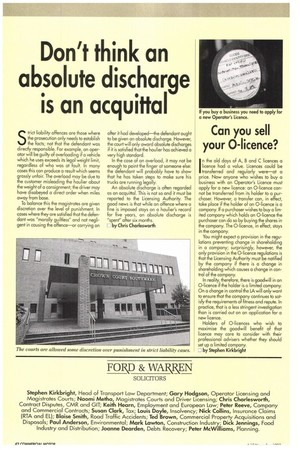Don't think an absolute discharge is an acquittal
Page 44

If you've noticed an error in this article please click here to report it so we can fix it.
Strict liability offences are those where the prosecution only needs to establish the facts; not that the defendant was directly responsible. For example, an operator will be guilty of overloading if a vehicle which he uses exceeds its legal weight limit, regardless of who was at fault. In many cases this can produce a result which seems grossly unfair. The overload may be due to the customer misleading the haulier about the weight of a consignment; the driver may have disobeyed a direct order when miles away from base.
To balance this the magistrates are given discretion over the level of punishment. In cases where they are satisfied that the defendant was "morally guiltless" and not negligent in causing the offence—or carrying on after it had developed—the defendant ought to be given an absolute discharge. However, the court will only award absolute discharges if it is satisfied that the haulier has achieved a very high standard. In the case of an overload, it may not be enough to point the Finger at someone else: the defendant will probably have to show that he has taken steps to make sure his trucks are running legally. An absolute discharge is often regarded as an acquittal. This is not so and it must be reported to the Licensing Authority. The good news is that while an offence where a Fine is imposed stays on a haulier's record for five years, an absolute discharge is "spent" after six months.
I• by Chris Charlesworth




























































































